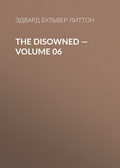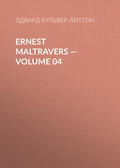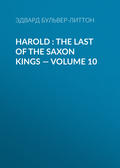
Эдвард Бульвер-Литтон
Zanoni
CHAPTER 3.XII
Was ist’s
Das hinter diesem Schleier sich verbirgt?
“Das Verschleierte Bild zu Sais.”
(What is it that conceals itself behind this veil?)
On returning from Vesuvius or Pompeii, you enter Naples through its most animated, its most Neapolitan quarter,—through that quarter in which modern life most closely resembles the ancient; and in which, when, on a fair-day, the thoroughfare swarms alike with Indolence and Trade, you are impressed at once with the recollection of that restless, lively race from which the population of Naples derives its origin; so that in one day you may see at Pompeii the habitations of a remote age; and on the Mole, at Naples, you may imagine you behold the very beings with whom those habitations had been peopled.
But now, as the Englishmen rode slowly through the deserted streets, lighted but by the lamps of heaven, all the gayety of day was hushed and breathless. Here and there, stretched under a portico or a dingy booth, were sleeping groups of houseless Lazzaroni,—a tribe now merging its indolent individuality amidst an energetic and active population.
The Englishman rode on in silence; for Glyndon neither appeared to heed nor hear the questions and comments of Mervale, and Mervale himself was almost as weary as the jaded animal he bestrode.
Suddenly the silence of earth and ocean was broken by the sound of a distant clock that proclaimed the quarter preceding the last hour of night. Glyndon started from his reverie, and looked anxiously round. As the final stroke died, the noise of hoofs rung on the broad stones of the pavement, and from a narrow street to the right emerged the form of a solitary horseman. He neared the Englishmen, and Glyndon recognised the features and mien of Zanoni.
“What! do we meet again, signor?” said Mervale, in a vexed but drowsy tone.
“Your friend and I have business together,” replied Zanoni, as he wheeled his steed to the side of Glyndon. “But it will be soon transacted. Perhaps you, sir, will ride on to your hotel.”
“Alone!”
“There is no danger!” returned Zanoni, with a slight expression of disdain in his voice.
“None to me; but to Glyndon?”
“Danger from me! Ah, perhaps you are right.”
“Go on, my dear Mervale,” said Glyndon; “I will join you before you reach the hotel.”
Mervale nodded, whistled, and pushed his horse into a kind of amble.
“Now your answer,—quick?”
“I have decided. The love of Viola has vanished from my heart. The pursuit is over.”
“You have decided?”
“I have; and now my reward.”
“Thy reward! Well; ere this hour to-morrow it shall await thee.”
Zanoni gave the rein to his horse; it sprang forward with a bound: the sparks flew from its hoofs, and horse and rider disappeared amidst the shadows of the street whence they had emerged.
Mervale was surprised to see his friend by his side, a minute after they had parted.
“What has passed between you and Zanoni?”
“Mervale, do not ask me to-night! I am in a dream.”
“I do not wonder at it, for even I am in a sleep. Let us push on.”
In the retirement of his chamber, Glyndon sought to recollect his thoughts. He sat down on the foot of his bed, and pressed his hands tightly to his throbbing temples. The events of the last few hours; the apparition of the gigantic and shadowy Companion of the Mystic, amidst the fires and clouds of Vesuvius; the strange encounter with Zanoni himself, on a spot in which he could never, by ordinary reasoning, have calculated on finding Glyndon, filled his mind with emotions, in which terror and awe the least prevailed. A fire, the train of which had been long laid, was lighted at his heart,—the asbestos-fire that, once lit, is never to be quenched. All his early aspirations—his young ambition, his longings for the laurel—were merged in one passionate yearning to surpass the bounds of the common knowledge of man, and reach that solemn spot, between two worlds, on which the mysterious stranger appeared to have fixed his home.
Far from recalling with renewed affright the remembrance of the apparition that had so appalled him, the recollection only served to kindle and concentrate his curiosity into a burning focus. He had said aright,—LOVE HAD VANISHED FROM HIS HEART; there was no longer a serene space amidst its disordered elements for human affection to move and breathe. The enthusiast was rapt from this earth; and he would have surrendered all that mortal beauty ever promised, that mortal hope ever whispered, for one hour with Zanoni beyond the portals of the visible world.
He rose, oppressed and fevered with the new thoughts that raged within him, and threw open his casement for air. The ocean lay suffused in the starry light, and the stillness of the heavens never more eloquently preached the morality of repose to the madness of earthly passions. But such was Glyndon’s mood that their very hush only served to deepen the wild desires that preyed upon his soul; and the solemn stars, that are mysteries in themselves, seemed, by a kindred sympathy, to agitate the wings of the spirit no longer contented with its cage. As he gazed, a star shot from its brethren, and vanished from the depth of space!
CHAPTER 3.XIII
O, be gone!
By Heaven, I love thee better than myself,
For I came hither armed against myself.
—“Romeo and Juliet.”
The young actress and Gionetta had returned from the theatre; and Viola fatigued and exhausted, had thrown herself on a sofa, while Gionetta busied herself with the long tresses which, released from the fillet that bound them, half-concealed the form of the actress, like a veil of threads of gold. As she smoothed the luxuriant locks, the old nurse ran gossiping on about the little events of the night, the scandal and politics of the scenes and the tireroom. Gionetta was a worthy soul. Almanzor, in Dryden’s tragedy of “Almahide,” did not change sides with more gallant indifference than the exemplary nurse. She was at last grieved and scandalised that Viola had not selected one chosen cavalier. But the choice she left wholly to her fair charge. Zegri or Abencerrage, Glyndon or Zanoni, it had been the same to her, except that the rumours she had collected respecting the latter, combined with his own recommendations of his rival, had given her preference to the Englishman. She interpreted ill the impatient and heavy sigh with which Viola greeted her praises of Glyndon, and her wonder that he had of late so neglected his attentions behind the scenes, and she exhausted all her powers of panegyric upon the supposed object of the sigh. “And then, too,” she said, “if nothing else were to be said against the other signor, it is enough that he is about to leave Naples.”
“Leave Naples!—Zanoni?”
“Yes, darling! In passing by the Mole to-day, there was a crowd round some outlandish-looking sailors. His ship arrived this morning, and anchors in the bay. The sailors say that they are to be prepared to sail with the first wind; they were taking in fresh stores. They—”
“Leave me, Gionetta! Leave me!”
The time had already passed when the girl could confide in Gionetta. Her thoughts had advanced to that point when the heart recoils from all confidence, and feels that it cannot be comprehended. Alone now, in the principal apartment of the house, she paced its narrow boundaries with tremulous and agitated steps: she recalled the frightful suit of Nicot,—the injurious taunt of Glyndon; and she sickened at the remembrance of the hollow applauses which, bestowed on the actress, not the woman, only subjected her to contumely and insult. In that room the recollection of her father’s death, the withered laurel and the broken chords, rose chillingly before her. Hers, she felt, was a yet gloomier fate,—the chords may break while the laurel is yet green. The lamp, waning in its socket, burned pale and dim, and her eyes instinctively turned from the darker corner of the room. Orphan, by the hearth of thy parent, dost thou fear the presence of the dead!
And was Zanoni indeed about to quit Naples? Should she see him no more? Oh, fool, to think that there was grief in any other thought! The past!—that was gone! The future!—there was no future to her, Zanoni absent! But this was the night of the third day on which Zanoni had told her that, come what might, he would visit her again. It was, then, if she might believe him, some appointed crisis in her fate; and how should she tell him of Glyndon’s hateful words? The pure and the proud mind can never confide its wrongs to another, only its triumphs and its happiness. But at that late hour would Zanoni visit her,—could she receive him? Midnight was at hand. Still in undefined suspense, in intense anxiety, she lingered in the room. The quarter before midnight sounded, dull and distant. All was still, and she was about to pass to her sleeping-room, when she heard the hoofs of a horse at full speed; the sound ceased, there was a knock at the door. Her heart beat violently; but fear gave way to another sentiment when she heard a voice, too well known, calling on her name. She paused, and then, with the fearlessness of innocence, descended and unbarred the door.
Zanoni entered with a light and hasty step. His horseman’s cloak fitted tightly to his noble form, and his broad hat threw a gloomy shade over his commanding features.
The girl followed him into the room she had just left, trembling and blushing deeply, and stood before him with the lamp she held shining upward on her cheek and the long hair that fell like a shower of light over the half-clad shoulders and heaving bust.
“Viola,” said Zanoni, in a voice that spoke deep emotion, “I am by thy side once more to save thee. Not a moment is to be lost. Thou must fly with me, or remain the victim of the Prince di —. I would have made the charge I now undertake another’s; thou knowest I would,—thou knowest it!—but he is not worthy of thee, the cold Englishman! I throw myself at thy feet; have trust in me, and fly.”
He grasped her hand passionately as he dropped on his knee, and looked up into her face with his bright, beseeching eyes.
“Fly with thee!” said Viola, scarce believing her senses.
“With me. Name, fame, honour,—all will be sacrificed if thou dost not.”
“Then—then,” said the wild girl, falteringly, and turning aside her face,—“then I am not indifferent to thee; thou wouldst not give me to another?”
Zanoni was silent; but his breast heaved, his cheeks flushed, his eyes darted dark and impassioned fire.
“Speak!” exclaimed Viola, in jealous suspicion of his silence.
“Indifferent to me! No; but I dare not yet say that I love thee.”
“Then what matters my fate?” said Viola, turning pale, and shrinking from his side; “leave me,—I fear no danger. My life, and therefore my honour, is in mine own hands.”
“Be not so mad,” said Zanoni. “Hark! do you hear the neigh of my steed?—it is an alarm that warns us of the approaching peril. Haste, or you are lost!”
“Why dost thou care for me?” said the girl, bitterly. “Thou hast read my heart; thou knowest that thou art become the lord of my destiny. But to be bound beneath the weight of a cold obligation; to be the beggar on the eyes of indifference; to cast myself on one who loves me not,—THAT were indeed the vilest sin of my sex. Ah, Zanoni, rather let me die!”
She had thrown back her clustering hair from her face while she spoke; and as she now stood, with her arms drooping mournfully, and her hands clasped together with the proud bitterness of her wayward spirit, giving new zest and charm to her singular beauty, it was impossible to conceive a sight more irresistible to the eye and the heart.
“Tempt me not to thine own danger,—perhaps destruction!” exclaimed Zanoni, in faltering accents. “Thou canst not dream of what thou wouldst demand,—come!” and, advancing, he wound his arm round her waist. “Come, Viola; believe at least in my friendship, my honour, my protection—”
“And not thy love,” said the Italian, turning on him her reproachful eyes. Those eyes met his, and he could not withdraw from the charm of their gaze. He felt her heart throbbing beneath his own; her breath came warm upon his cheek. He trembled,—HE! the lofty, the mysterious Zanoni, who seemed to stand aloof from his race. With a deep and burning sigh, he murmured, “Viola, I love thee! Oh!” he continued passionately, and, releasing his hold, he threw himself abruptly at her feet, “I no more command,—as woman should be wooed, I woo thee. From the first glance of those eyes, from the first sound of thy voice, thou becamest too fatally dear to me. Thou speakest of fascination,—it lives and it breathes in thee! I fled from Naples to fly from thy presence,—it pursued me. Months, years passed, and thy sweet face still shone upon my heart. I returned, because I pictured thee alone and sorrowful in the world, and knew that dangers, from which I might save thee, were gathering near thee and around. Beautiful Soul! whose leaves I have read with reverence, it was for thy sake, thine alone, that I would have given thee to one who might make thee happier on earth than I can. Viola! Viola! thou knowest not—never canst thou know—how dear thou art to me!”
It is in vain to seek for words to describe the delight—the proud, the full, the complete, and the entire delight—that filled the heart of the Neapolitan. He whom she had considered too lofty even for love,—more humble to her than those she had half-despised! She was silent, but her eyes spoke to him; and then slowly, as aware, at last, that the human love had advanced on the ideal, she shrank into the terrors of a modest and virtuous nature. She did not dare,—she did not dream to ask him the question she had so fearlessly made to Glyndon; but she felt a sudden coldness,—a sense that a barrier was yet between love and love. “Oh, Zanoni!” she murmured, with downcast eyes, “ask me not to fly with thee; tempt me not to my shame. Thou wouldst protect me from others. Oh, protect me from thyself!”
“Poor orphan!” said he, tenderly, “and canst thou think that I ask from thee one sacrifice,—still less the greatest that woman can give to love? As my wife I woo thee, and by every tie, and by every vow that can hallow and endear affection. Alas! they have belied love to thee indeed, if thou dost not know the religion that belongs to it! They who truly love would seek, for the treasure they obtain, every bond that can make it lasting and secure. Viola, weep not, unless thou givest me the holy right to kiss away thy tears!”
And that beautiful face, no more averted, drooped upon his bosom; and as he bent down, his lips sought the rosy mouth: a long and burning kiss,—danger, life, the world was forgotten! Suddenly Zanoni tore himself from her.
“Hearest thou the wind that sighs, and dies away? As that wind, my power to preserve thee, to guard thee, to foresee the storm in thy skies, is gone. No matter. Haste, haste; and may love supply the loss of all that it has dared to sacrifice! Come.”
Viola hesitated no more. She threw her mantle over her shoulders, and gathered up her dishevelled hair; a moment, and she was prepared, when a sudden crash was heard below.
“Too late!—fool that I was, too late!” cried Zanoni, in a sharp tone of agony, as he hurried to the door. He opened it, only to be borne back by the press of armed men. The room literally swarmed with the followers of the ravisher, masked, and armed to the teeth.
Viola was already in the grasp of two of the myrmidons. Her shriek smote the ear of Zanoni. He sprang forward; and Viola heard his wild cry in a foreign tongue. She saw the blades of the ruffians pointed at his breast! She lost her senses; and when she recovered, she found herself gagged, and in a carriage that was driven rapidly, by the side of a masked and motionless figure. The carriage stopped at the portals of a gloomy mansion. The gates opened noiselessly; a broad flight of steps, brilliantly illumined, was before her. She was in the palace of the Prince di —.
CHAPTER 3.XIV
Ma lasciamo, per Dio, Signore, ormai
Di parlar d’ ira, e di cantar di morte.
“Orlando Furioso,” Canto xvii. xvii.
(But leave me, I solemnly conjure thee, signor, to speak of wrath, and to sing of death.)
The young actress was led to, and left alone in a chamber adorned with all the luxurious and half-Eastern taste that at one time characterised the palaces of the great seigneurs of Italy. Her first thought was for Zanoni. Was he yet living? Had he escaped unscathed the blades of the foe,—her new treasure, the new light of her life, her lord, at last her lover?
She had short time for reflection. She heard steps approaching the chamber; she drew back, but trembled not. A courage not of herself, never known before, sparkled in her eyes, and dilated her stature. Living or dead, she would be faithful still to Zanoni! There was a new motive to the preservation of honour. The door opened, and the prince entered in the gorgeous and gaudy custume still worn at that time in Naples.
“Fair and cruel one,” said he, advancing with a half-sneer upon his lip, “thou wilt not too harshly blame the violence of love.” He attempted to take her hand as he spoke.
“Nay,” said he, as she recoiled, “reflect that thou art now in the power of one that never faltered in the pursuit of an object less dear to him than thou art. Thy lover, presumptuous though he be, is not by to save thee. Mine thou art; but instead of thy master, suffer me to be thy slave.”
“Prince,” said Viola, with a stern gravity, “your boast is in vain. Your power! I am NOT in your power. Life and death are in my own hands. I will not defy; but I do not fear you. I feel—and in some feelings,” added Viola, with a solemnity almost thrilling, “there is all the strength, and all the divinity of knowledge—I feel that I am safe even here; but you—you, Prince di —, have brought danger to your home and hearth!”
The Neapolitan seemed startled by an earnestness and boldness he was but little prepared for. He was not, however, a man easily intimidated or deterred from any purpose he had formed; and, approaching Viola, he was about to reply with much warmth, real or affected, when a knock was heard at the door of the chamber. The sound was repeated, and the prince, chafed at the interruption, opened the door and demanded impatiently who had ventured to disobey his orders, and invade his leisure. Mascari presented himself, pale and agitated: “My lord,” said he, in a whisper, “pardon me; but a stranger is below, who insists on seeing you; and, from some words he let fall, I judged it advisable even to infringe your commands.”
“A stranger!—and at this hour! What business can he pretend? Why was he even admitted?”
“He asserts that your life is in imminent danger. The source whence it proceeds he will relate to your Excellency alone.”
The prince frowned; but his colour changed. He mused a moment, and then, re-entering the chamber and advancing towards Viola, he said,—
“Believe me, fair creature, I have no wish to take advantage of my power. I would fain trust alone to the gentler authorities of affection. Hold yourself queen within these walls more absolutely than you have ever enacted that part on the stage. To-night, farewell! May your sleep be calm, and your dreams propitious to my hopes.”
With these words he retired, and in a few moments Viola was surrounded by officious attendants, whom she at length, with some difficulty, dismissed; and, refusing to retire to rest, she spent the night in examining the chamber, which she found was secured, and in thoughts of Zanoni, in whose power she felt an almost preternatural confidence.
Meanwhile the prince descended the stairs and sought the room into which the stranger had been shown.
He found the visitor wrapped from head to foot in a long robe, half-gown, half-mantle, such as was sometimes worn by ecclesiastics. The face of this stranger was remarkable. So sunburnt and swarthy were his hues, that he must, apparently, have derived his origin amongst the races of the farthest East. His forehead was lofty, and his eyes so penetrating yet so calm in their gaze that the prince shrank from them as we shrink from a questioner who is drawing forth the guiltiest secret of our hearts.
“What would you with me?” asked the prince, motioning his visitor to a seat.
“Prince of —,” said the stranger, in a voice deep and sweet, but foreign in its accent,—“son of the most energetic and masculine race that ever applied godlike genius to the service of Human Will, with its winding wickedness and its stubborn grandeur; descendant of the great Visconti in whose chronicles lies the history of Italy in her palmy day, and in whose rise was the development of the mightiest intellect, ripened by the most restless ambition,—I come to gaze upon the last star in a darkening firmament. By this hour to-morrow space shall know it not. Man, unless thy whole nature change, thy days are numbered!”
“What means this jargon?” said the prince, in visible astonishment and secret awe. “Comest thou to menace me in my own halls, or wouldst thou warn me of a danger? Art thou some itinerant mountebank, or some unguessed-of friend? Speak out, and plainly. What danger threatens me?”
“Zanoni and thy ancestor’s sword,” replied the stranger.
“Ha! ha!” said the prince, laughing scournfully; “I half-suspected thee from the first. Thou art then the accomplice or the tool of that most dexterous, but, at present, defeated charlatan? And I suppose thou wilt tell me that if I were to release a certain captive I have made, the danger would vanish, and the hand of the dial would be put back?”
“Judge of me as thou wilt, Prince di —. I confess my knowledge of Zanoni. Thou, too, wilt know his power, but not till it consume thee. I would save, therefore I warn thee. Dost thou ask me why? I will tell thee. Canst thou remember to have heard wild tales of thy grandsire; of his desire for a knowledge that passes that of the schools and cloisters; of a strange man from the East who was his familiar and master in lore against which the Vatican has, from age to age, launched its mimic thunder? Dost thou call to mind the fortunes of thy ancestor?—how he succeeded in youth to little but a name; how, after a career wild and dissolute as thine, he disappeared from Milan, a pauper, and a self-exile; how, after years spent, none knew in what climes or in what pursuits, he again revisited the city where his progenitors had reigned; how with him came the wise man of the East, the mystic Mejnour; how they who beheld him, beheld with amaze and fear that time had ploughed no furrow on his brow; that youth seemed fixed, as by a spell, upon his face and form? Dost thou not know that from that hour his fortunes rose? Kinsmen the most remote died; estate upon estate fell into the hands of the ruined noble. He became the guide of princes, the first magnate of Italy. He founded anew the house of which thou art the last lineal upholder, and transferred his splendour from Milan to the Sicilian realms. Visions of high ambition were then present with him nightly and daily. Had he lived, Italy would have known a new dynasty, and the Visconti would have reigned over Magna-Graecia. He was a man such as the world rarely sees; but his ends, too earthly, were at war with the means he sought. Had his ambition been more or less, he had been worthy of a realm mightier than the Caesars swayed; worthy of our solemn order; worthy of the fellowship of Mejnour, whom you now behold before you.”
The prince, who had listened with deep and breathless attention to the words of his singular guest, started from his seat at his last words. “Imposter!” he cried, “can you dare thus to play with my credulity? Sixty years have flown since my grandsire died; were he living, he had passed his hundred and twentieth year; and you, whose old age is erect and vigorous, have the assurance to pretend to have been his contemporary! But you have imperfectly learned your tale. You know not, it seems, that my grandsire, wise and illustrious indeed, in all save his faith in a charlatan, was found dead in his bed, in the very hour when his colossal plans were ripe for execution, and that Mejnour was guilty of his murder.”
“Alas!” answered the stranger, in a voice of great sadness, “had he but listened to Mejnour,—had he but delayed the last and most perilous ordeal of daring wisdom until the requisite training and initiation had been completed,—your ancestor would have stood with me upon an eminence which the waters of Death itself wash everlastingly, but cannot overflow. Your grandsire resisted my fervent prayers, disobeyed my most absolute commands, and in the sublime rashness of a soul that panted for secrets, which he who desires orbs and sceptres never can obtain, perished, the victim of his own frenzy.”
“He was poisoned, and Mejnour fled.”
“Mejnour fled not,” answered the stranger, proudly—“Mejnour could not fly from danger; for to him danger is a thing long left behind. It was the day before the duke took the fatal draft which he believed was to confer on the mortal the immortal boon, that, finding my power over him was gone, I abandoned him to his doom. But a truce with this: I loved your grandsire! I would save the last of his race. Oppose not thyself to Zanoni. Yield not thy soul to thine evil passions. Draw back from the precipice while there is yet time. In thy front, and in thine eyes, I detect some of that diviner glory which belonged to thy race. Thou hast in thee some germs of their hereditary genius, but they are choked up by worse than thy hereditary vices. Recollect that by genius thy house rose; by vice it ever failed to perpetuate its power. In the laws which regulate the universe, it is decreed that nothing wicked can long endure. Be wise, and let history warn thee. Thou standest on the verge of two worlds, the past and the future; and voices from either shriek omen in thy ear. I have done. I bid thee farewell!”
“Not so; thou shalt not quit these walls. I will make experiment of thy boasted power. What, ho there!—ho!”
The prince shouted; the room was filled with his minions.
“Seize that man!” he cried, pointing to the spot which had been filled by the form of Mejnour. To his inconceivable amaze and horror, the spot was vacant. The mysterious stranger had vanished like a dream; but a thin and fragrant mist undulated, in pale volumes, round the walls of the chamber. “Look to my lord,” cried Mascari. The prince had fallen to the floor insensible. For many hours he seemed in a kind of trance. When he recovered, he dismissed his attendants, and his step was heard in his chamber, pacing to and fro, with heavy and disordered strides. Not till an hour before his banquet the next day did he seem restored to his wonted self.







